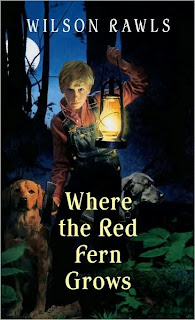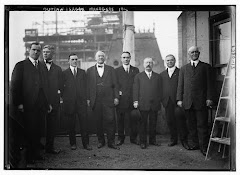There a certain books you read in life that really affect you and stick with you over the years. Perhaps it was the time in your life you read them, or maybe they actually taught you something about the world. Maybe you don't even know why that affected you so much. I've asked SLYBC members to share the books that "blew your mind" over the years.
Books that Blew Elle Ewok's Mind (
why does that sound dirty?):
GRADE SCHOOL:
My Brother Sam is Dead, James Lincoln Collier and Christopher Collier (1976)
I read
My Brother Sam is Dead at a very young age even though is technically fits in the "young adult" cateogry. Perhaps I was too young to read it because it affected me probably more than any book I have ever read in my life. It was the first time I had ever read a story that didn't have a happy ending. It was the first story I read where something horrible happened to a good person. It was the first story I ever read that included death. Up until reading this book it had not occured to me that the world could be a cruel and senseless place. It was devastating. I remember being physically nauseous I was so upset. I read this book 25 years ago so I can't say whether or not it is a good book - just that I will never forget how much it affected me.
MIDDLE SCHOOL:
Where the Red Fern Grows, Wilson Rawls (1961)
I have never cried so hard in my entire life than when reading the end of this book. I remember exactly where I was, I remember the color of the bedspread I was laying on even though it was 20 years ago at least. My love for animals, I feel, is one of my defining characteristics and
Where the Red Fern Grows had a big part in propelling that lifelong devotion.
JUNIOR HIGH SCHOOL:
A Tree Grows in Brooklyn, Betty Smith (1943)
I have yet to meet a female (woman or girl) who does not LOVE this book. I was 14 and at choir/music camp when I read
A Tree Grows in Brooklyn. In any free moment I could find, I would race back to my dorm room to read this 528 page perfect novel. This
IS the coming of age story for girls and it is fabulous. It was the first book I read that showed me what a great novel can accomplish as it relates to character development and describing interpersonal realtionships. A book to be adored.
HIGH SCHOOL:
Crime and Punishment, Fyodor Dostoyevsky (1866)
I read
Crime and Punishment my senior year in high school as it was part of my English curriculum. We read many great works that year but
Crime and Punishment took the cake. It also spearheaded my deep devotion and obsession with Classic Russian Literature which consumed about 4 years of my life and still has a significant hold over my mind and heart. It is probably why I ended up marrying a man of Russian descent in the Russian Orthodox Church! Maybe not ;)
Crime and Punishment was the first time I realized how truly significant, profound and monumental a novel could be (although I must confess I didn't love the end). Nevertheless, it will always hold an extremely special place in my heart.
COLLEGE:
The Lord of the Rings, J.R.R. Tolkien (1937-1949)
I read
The Hobbit is grade school and didn't like it so I never bothered with
Lord of the Rings until I was in college. My mistake.
The Lord of the Rings is absolute perfection. It is my desert island book. Not only is its scope mind-blowing (Tolkien created actual languages for God's Sake!) but its themes of courage, friendship and sacrifice are inspiring to all people of all times, ages and cultures. It is the perfect adventure fairy tale. I literally get goose-bumps just thinking about it. My husband and I named our cat after a character in
The Lord of the Rings! (Gimli). I have been a fantasy freak ever since reading this book/s.
LAW SCHOOL:
Homicide: A Year on the Killing Streets, David Simon (1991)
One of my law school professors was an adjunct from Chicago who was an Assistant United States Attorney. This book was on his "recommended but not mandatory" list of course materials.
Homicide describes the year Baltimore Sun reporter David Simon spent with the detectives of the Baltimore Police Department homicide squad. It was later turned into a tv series. I read the book because my Grandfather was a homicide detective in NYC and I idolized him right up until he died when I was 14. I thought this book would let me in on what his life and work was like. I wasn't expecting much though. I remember this book because I had never been so pleasantly surprised by a book before. To say I loved
Homicide would be an understatement.
Homicide is probably the best non-fiction book I have ever read. It was dramatic, suspenseful, horrifying, inspiring and even incredibly funny. This book included some of the most disturbing things I have ever read along with some of the funniest things I have ever read. It basically perfectly reflects the juxtaposition of how horrible, wonderful, hilarious, disgusting and ridiculous life can be.
20-SOMETHING:
Jonathan Strange & Mr. Norrell, Susanna Clarke (2004)
This is the book I wish I had written. A grand tale full of adventure and myserty and dark magic written with such artistry that it makes me want to cry. To me, at the time I read it,
Jonathan Strange & Mr. Norrell was the perfect combination of imaginative story-telling and perfect writing. Although this book is over 1,000 pages I literally made my self slow down while reading it because it made me sad when I realized it was coming to the end. I have recommended this book to everyone and it seems no one loves it as much as I do but I don't care. This book is absolute perfection in my mind and it is my dream-fantasy in life to one day write something comparable.
30-SOMETHING:
Hyperion, Dan Simmons (1989)
I have been Dan Simmons' book-slave ever since reading
Hyperion. I will literally buy anything this man writes for giving me this book.
Hyperion was the first science ficiton book I ever read which is amazing because I am such a fantasy dork and the genres are so closely related. That said,
Hyperion really affected me because it was the first time the power of someone else's imagination really knocked my socks off. I used to think I had a good imagination. Not so much anymore after reading
Hyperion. I was literally in awe of the originality and cleverness of this book. It was also profound and moving.
Hyperion is horror, science-fiction and fantasy rolled into one that makes meaningful commentary on the horrible-beauty of life.




















 Reviewer: Elle Ewok
Reviewer: Elle Ewok


